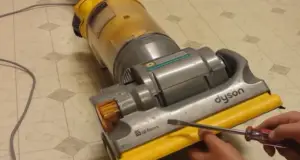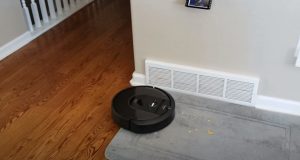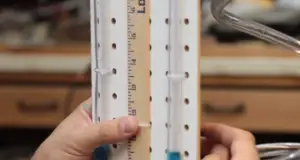When looking for a vacuum cleaner, the filter is one of the most important things to consider. It makes a bigger impact than you might think. Especially for individuals who suffer from allergies or asthma. Some vacuums arrive with the filter which the other doesn’t. Do the Dyson vacuums include the HEPA filters? Keep reading to know.
You may have heard about HEPA filters and wondered if your existing Dyson vacuum is equipped with one of these filters. Perhaps you’re in the market for a Dyson. And want to know if the model you’re considering will include a HEPA filter.
The HEPA filtration technology is included in certain current Dyson vacuums, but it is not included in others. On the other hand, recent advertising has many people asking questions. Whether or not they are actually using a HEPA Dyson vacuum at home. When you vacuum, you’re usually attempting to get rid of crumbs, grime, dust, and pet hair from the surfaces of your home. So that may be difficult.
However, vacuums are excellent at taking up dirt, dust, and pet hair. So, none are as effective as HEPA filters at keeping them contained within the vacuum machine.
As a result, certain vacuums do not include HEPA filters. It may accidentally disperse dust and debris into the air in your house when cleaning. How can you know whether your Dyson vacuum cleaner has a HEPA filter?
What Is A HEPA Filter?
Before we know if your Dyson vacuums have HEPA filters or not, let us know what HEPA filters are. High-Efficiency Particulate Air (HEPA) is an acronym for High-Efficiency Particulate Air. HEPA systems are carefully built to prevent this when dust, filth, and big particles escape the vacuum system and return to the atmosphere.
It was during World War II when the first filters were developed. Radioactive particles from the atomic bomb were absorbed by the filter, which American scientists created. It wasn’t until 1983 that a procedure for standardizing and certifying HEPA filters was created.
According to industry requirements, the filter must eliminate 99.7 percent of airborne particles. And it is larger than 0.3 microns in size after it has passed through it. However, although this sounds highly technical, it means that HEPA filters keep the microscopic particles. It passes through them contained within the vacuum and prevents them from escaping.
While Dyson vacuums are excellent at keeping dust trapped within. Dyson vacuums equipped with HEPA filters take dust trapping to an all-new level of efficiency.
This degree of absorption is extremely beneficial for individuals who suffer from allergies or asthma and those who like clean air. It does this by keeping particles contained within the vacuum. And preventing them from escaping and settling on the surfaces that have just been vacuumed.
In addition to vacuums, you’ll commonly find HEPA filters in your air purifier. And the filter of your heating and cooling system.
Who Needs HEPA Filters?
Most people like to live in houses as clean as possible. But HEPA filters are particularly useful for individuals who have allergies to dust, pollen, and pet dander. HEPA filters are available at a variety of price points.
People who suffer from these sorts of allergies may have symptoms if these chemicals fall to the floor and remain on their carpet. So, it is where they can be thrown back into the air by movement.
Vacuum cleaners equipped with HEPA filters capture and hold these contaminants. It is removing them from the environment and preventing them from triggering allergies.
How Does Dyson Vacuums With HEPA Filters Work?
Undoubtedly, you’ve considered the quality of the air you’re breathing at some point in your lifetime. It is critical to maintaining good air quality in order to help avoid the spread of allergies, bacteria, and other airborne diseases among people.
However, although exterior issues such as vehicle exhaust and other pollutants may be at the forefront of your thoughts, it’s essential to ensure that the air within your house is as clean and fresh as possible as well.
Many of the pollutants found in the home that cause allergy flare-ups are microscopic in size. So, even a super powerful vacuum appears to be cleaning the room effectively. It may be leaking microns (particles measuring one-millionth of a meter in size) of dust and debris back into the air, triggering an allergic reaction.
In order to capture these tiny allergens, the most essential filter is a HEPA filter, which sits on the vacuum exhaust. It is where the air is blown out of the vacuum and back into the room.
These very high-efficiency filters capture a wide range of contaminants, including dust, pollen, pet dander, smoke, and more. High-efficiency particulate air (HEPA) filters are made up of small interlaced glass fibers. And that intercept and capture minute particles as they travel through them.
Because HEPA filters are available on a wide range of upright, canister, and stick vacuums, if you have a family that is sensitive to dust, it should be reasonably simple to locate a machine that meets your requirements.
Does Your Dyson Have A HEPA Filter?
The most straightforward and reliable method of determining whether or not your Dyson (or any other brand of vacuum) has a HEPA filter is to examine the filter itself.
When it comes to true HEPA filters, they come with serial numbers to demonstrate that they satisfy the specified particle absorption requirements. You can also see their test results, which should be onto the filter itself.
Results of the tests will indicate that the filter is capable of capturing a minimum of 99.97 percent of particles with a diameter of 0.3 microns or less. The findings suggest that the filter is not a genuine HEPA filter if the results show anything less than that.
Conclusion
Furthermore, True HEPA vacuums are readily accessible and are not necessarily more costly than similar regular vacuums. You may study and purchase them in the same way that you would any other regular home item.
Once you’ve determined that a vacuum is really HEPA-compliant. You may decide based on the typical considerations. Such as kind, price, performance, convenience features, brand reputation, and so on.




